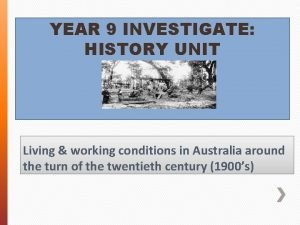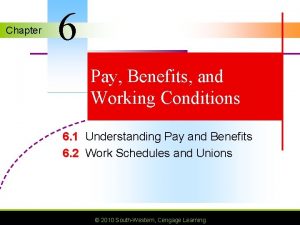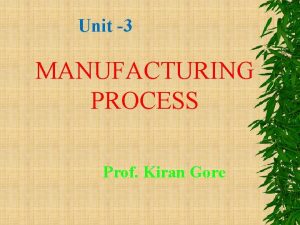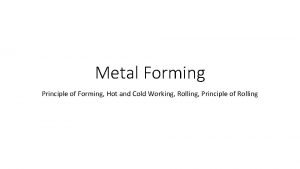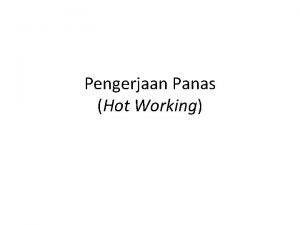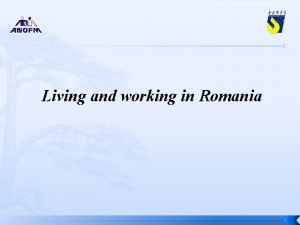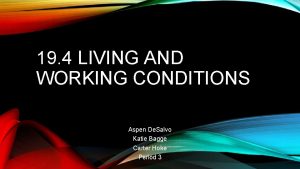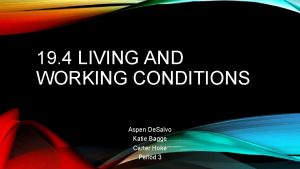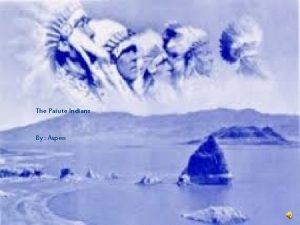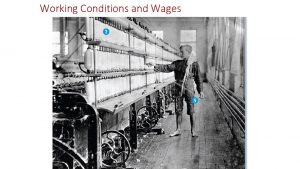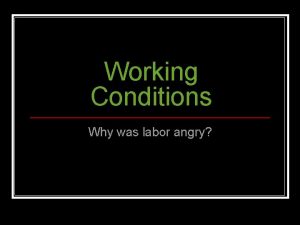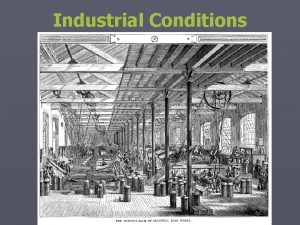19 4 LIVING AND WORKING CONDITIONS Aspen De












- Slides: 12

19. 4 LIVING AND WORKING CONDITIONS Aspen De. Salvo Katie Bagge Carter Hoke Period 3

OBJECTIVES TO ANSWER 1) Explain Adam Smith’s “law of Supply & Demand” and “Law of Competition” work 2) Describe theory of Utilitarianism was social reform. The Greater Good 3) List & Describe social reformers and the issue that reformer took. 4) Describe how workers tried to improve their situation

TERMS TO DEFINE • Mercantilism: The economic theory based on the belief that the world contained a fixed amount of wealth, and the only way to increase a countries wealth was to steal from another country. • Utilitarianism: The view that an action is morally right when it produces the most good. • Union: Association of workers that would collect dues and money of workers while on strike and planned actions and demand for the factory they worked act. • Free enterprise: economic system based on supply, demand, and competition, where laws and regulations are thought to interfere with international trade. • Strike: bargaining method involving the refusal of workers to work until their demands have been met. • Collective Bargaining: process of negotiation between union members and management.

ADAM SMITH • A strong believer in free enterprise- the ability to run a business without government interference • Strong believer in the “Supply & Demand” as well as “The Law of Competition”. When demand increase, so does price. With competition involved the prices are drove down lower. • Was the Philosopher that wrote “The Wealth of Nations” in 1776 • Referred to competition as “an invisible hand” which allowed the economy to stay stable

LAISSEZ-FAIRE • Meaning “Let Do” but interpreted as Leave it alone. • Similar to Raw Capitalism with the idea that the government should have little to no interference, yet different as raw capitalism is said to have a disregard for durability, sustainability, and lack of morality. • Adopted by King Louis XV of France in of 1754 but later revoked in 1770 due to their bread prices. • It’s a French word

THOMAS MALTHUS AND DAVID RICARDO • Malthus was a strong supporter of Adam Smith’s ideas. He wrote a book, An Essay on The Principals of Population, that argued how an increased population was the largest obstacle for human evolution. He was a clergyman who later turned to be a professor in economics. (Left) • David Ricardo was also a strong supporter of Adam Smith’s ideas. He was a business man of England who was elected to the house of commons. (Right)

JOHN STUART MILL John was an English Philosopher and economist, best known for his political and moral works. Many were on Liberty, which argued for individuality, and Utilitarianism, which helped develop Bentham’s Theory of Utilitarianism.

THE EARLY REFORM LAWS • Britain made attempts early on to improve working conditions. Women and children under ten years old were banned from the coal mines, hours and conditions were set for children working in cotton mills. The Factory Act of 1833 banned Textile mills from hiring children under the age of 9, and many laws continued to restrict working hours, ages, and conditions in Britain.

LAW OF SUPPLY AND DEMAND THE LAW OF COMPETITION • “invisible hand” that naturally guides economy • Supply dictates a products availability and demand dictates it’s price • Got noticed by market places way before it was mentioned in any public works • The Law of Competition involved self interest, but was kept in check by competition.

WORKERS IMPROVE THEIR SITUATIONS • Workers went on strike • Refused to work instead of going to school • Young people made up a considerable amount of the workforce, they would’ve rather been in school • Workers organized unions, those unions would pay workers while they were on strike • Strikes were originally illegal but legalized later on.

CHARLES DICKENS AND HIS ROLE • Charles used many of his novels to attack selfish business owners over their actions

HUMANITARIANS • These were people who worked to fight for the rights of workers
 Living and working conditions in australia 1900
Living and working conditions in australia 1900 Chapter 6 pay benefits and working conditions
Chapter 6 pay benefits and working conditions Hot working and cold working difference
Hot working and cold working difference Principle of hot working process
Principle of hot working process Machining operations
Machining operations Proses pembentukan logam
Proses pembentukan logam Living and working in romania
Living and working in romania Living and working in norway
Living and working in norway Living and working in belgium
Living and working in belgium What is the job description of a computer programmer
What is the job description of a computer programmer Kondisi kerja dan psikologi kerekayasaan
Kondisi kerja dan psikologi kerekayasaan Capitalism def
Capitalism def Fair working conditions
Fair working conditions
